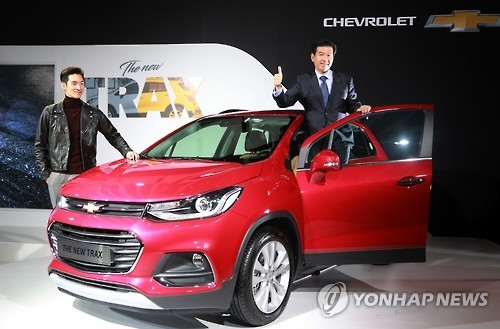GM Korea Co., the South Korean unit of US automaker General Motors Co., will likely see its market share in South Korea grow to over 10 percent for the first time in nine years, company officials said Wednesday.
In the January-October period, GM Korea sold 144,726 vehicles in the South Korean market, accounting for 11.2 percent of 1,278,906 cars sold by five car manufacturers here over the cited period.
In the January-October period, GM Korea sold 144,726 vehicles in the South Korean market, accounting for 11.2 percent of 1,278,906 cars sold by five car manufacturers here over the cited period.

The five local automakers include industry leader Hyundai Motor Co., its smaller affiliate Kia Motors Corp., Ssangyong Motor Co., the local unit of Indian automaker Mahindra & Mahindra Ltd., and Renault Samsung Motors Co., the local unit of French automaker Renault S.A.
GM Korea's market share as of end-October marked a 1 percentage point gain from a year earlier.
Should its annual market share breach the 10-percent mark, it will be the first time since 2007 when its local market share came to 10.3 percent.
The gain in GM Korea's domestic market share follows a series of new vehicle models launched here, including the Spark minicar and the Malibu midsized sedan.
In the first 10 months of the year, the Spark sold 64,423 units, up 35.3 percent from the same period last year, according to the company.
Sales of the Malibu nearly doubled over the cited period to 28,355 from 14,329.
"The company will do its utmost to achieve a double-digit market share during the remainder of the year, based on growing sales of the Chevrolet Spark, the best-selling model in its segment this year, and the Malibu, which also has remained the No. 1 selling midsize car in the domestic market since June," a company official said, while asking not to be identified.
GM Korea's efforts to secure a 10 percent or greater share have been strong but to little avail in the market nearly dominated by the local industry leader Hyundai Motor and its smaller affiliate Kia Motors.
Hyundai and Kia, which together form Hyundai Motor Group, the world's fifth-largest automotive group, have long enjoyed a combined market share of well over 80 percent.
In the January-October period, the two affiliated automakers again took up a combined market share of 75.6 percent in the local market.
"The most important objective for us is to grow in the domestic market," GM Korea President James Kim said at the beginning of this year when the Korean-American chief of GM Korea also announced the then scheduled launch of the new Malibu and the Impala luxury sedan as part of such efforts.
Against such a backdrop, GM Korea's domestic sales have been on a steady increase in recent months, again spiking 14 percent on-year to 16,736 cars last month.
Still, GM Korea is setting its own bars higher, seeking to achieve a 10 percent or greater market share among all new vehicles sold here in 2016, including commercial trucks, buses and imported vehicles.
As of end-September, GM Korea's cumulative market share for all new vehicles sold here stood at 9.7 percent, advancing from 8.6 percent in 2015 and further solidifying its position as the third-largest carmaker in South Korea.
"A double-digit market share will have a significant meaning all in itself, but it is also important for us to achieve the goal in that it will show us and others like us here the possibility of growth and that local customers will purchase vehicles based on their quality and competitiveness instead of just the name they carry," a GM Korea official said.
In terms of all vehicles sold, the combined market share of the two industry leaders stood at 66.3 percent as of end-September, while that of imported vehicles came to 12.5 percent, according to data provided by GM Korea. (Yonhap)










![[Hello India] Hyundai Motor vows to boost 'clean mobility' in India](http://res.heraldm.com/phpwas/restmb_idxmake.php?idx=644&simg=/content/image/2024/04/25/20240425050672_0.jpg&u=)







